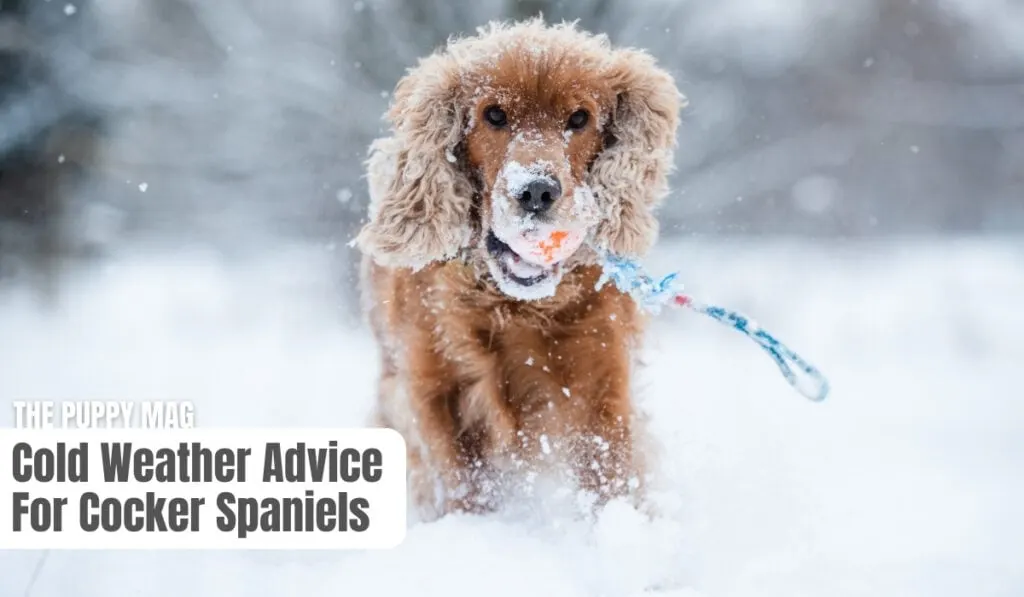As the winter months come by, we receive many important questions from concerned owners regarding their cocker spaniel and cold weather.
From whether or not cocker spaniels feel the cold, to what temperatures they can handle, all of these crucial questions and more will be answered below.
Do Cocker Spaniels Get Cold Easily?

Cocker spaniels handle cold weather quite well, but they are not immune to it. Despite having a relatively thick double coat, cockers can still get too cold if they get wet or are out in cold conditions for too long.
Of course, it also depends heavily on the temperature and weather conditions. If a cocker spaniel remains dry, most will not get cold easily in temperatures above 0C (32F).
Four factors that determine how easily a cocker spaniel will get cold:
- Age
- Health
- Temperature outside
- Weather conditions
What Temperature Is Too Cold For a Cocker Spaniel
All cocker spaniels will have a different temperature tolerance, which mostly depends on their age and existing health.
To remain on the safe side:
- Puppies, seniors, or those with health issues should remain indoors when temperatures are below 10C (50F).
- Healthy adult cocker spaniels (2-8 years old) should be fine in temperatures as low as 5C (40F).
Some cockers will be safe and happy in even lower temperatures assuming the outside weather conditions are dry, sunny, and without wind.
This leads me on to the next crucial point…
Weather Conditions Are More Important Than Temperature
Weather conditions have a bigger impact than temperature. So always keep in this in mind!
For example:
- Zero degrees Celcius in good conditions (sunny, dry, no wind) is completely tolerable for most double-coated breeds, including cocker spaniels…
- However, zero degrees Celcius in bad conditions (wet, windy, rainy) is far too cold for the same dogs.
Why is this?
Once your cocker spaniel becomes wet they practically lose their ability to keep themselves warm. So, if it’s raining outside, damp, snowy or foggy, then their tolerance to cold is significantly less.
Only if your cocker remains dry are they ready to handle cold temperatures.
Can Cocker Spaniels Live Outside In Winter?
Technically yes, a healthy adult cocker spaniel can live outside in winter, assuming they have adequate weatherproof housing.
But for most, this is a questionable choice for a cocker spaniel…
- Cockers are family pets that prefer living and sleeping inside the home with their owners and loved ones.
Unless in a large pack and used solely for working purposes, a cocker spaniel will quickly get stressed, anxious, fearful, potentially aggressive, and even depressed if made to live outside (winter or not).
So, while the technical answer is yes, living outside is not advised for most cocker spaniels.
Do Cocker Spaniels Like The Snow?
Yes! Cocker spaniels love playing around in the snow. But it’s best to keep it short. 15-20 minutes is when most cockers will start getting wet and very cold and should go back inside.
If your cocker spaniel is a very young puppy (under 6 months), a senior (over 8 years), or has existing health issues, it’s best to keep them indoors whenever it snows.
Do Cocker Spaniels Need Coats In Winter?
Although not necessary, cocker spaniels can certainly benefit from a water resistant winter jacket during the coldest months.
Dog jackets offer extra protection and can help keep your cocker spaniel dry and warm in extra cold conditions.
Winter jackets will allow you to go out with your cocker spaniel in lower temperatures and more unfavourable conditions than you otherwise would have.
Our favorite dog jacket for winter: Kurgo Weather Resistant Winter Jacket
5 Signs Your Cocker Spaniel Is Too Cold
If your cocker spaniel gets too cold they’ll let you know with one of the following signs. We just have to remain observant when out on walks.
1. Holding their paws up
If your cocker spaniel is too cold one of the first things they’ll do is hold their paws off the ground. Usually the front paws.
The paws are the first point of contact to the cold ground and are also very sensitive to temperature. If you notice your cocker doing this, it’s time to head back inside as soon as possible.
2. Shivering
If your cocker spaniel is shaking, trembling, or shivering the they are already too cold and should go back inside as soon as possible.
Shivering is an involuntary action the body does in order to create kinetic heat and keep warm. Shivering happens when the muscles contract and relax rapidly.
Puppies and seniors will tend to shiver much more easily than healthy adults.
3. Slowing down or refusing to walk
An important sign to watch out for during their daily exercise is slowing down or refusing to walk.
A dog that gets too cold will instantly slow their movements down and in severe cases, completely refuse to take a step further!
Keep an eye on your spaniel’s movement and body language and be ready to head back inside should you see them slowing down.
4. Tail tucking & hunching their back
Assuming your cocker spaniel has not had their tail docked, you’ll be able to use it as a helpful indicator to how they are doing in cold weather.
Dogs that are very cold will tuck their tail between their legs and hunch their back at the same time.
If you see this, head to a warmer place as soon as possible!
5. Any other unusual behavior
Apart from the signs above there can be a range of unusual behavior coming from a dog that’s too cold.
If you notice the following, your cocker spaniel may be too cold:
- Whining or crying
- Sudden barking
- Slow breathing
- Dilated pupils
- Unusual body language or movements
- Dizziness
- Lack of attention
- Not reacting to your voice or commands
7 Tips To Keep Your Cocker Spaniel Safe In Winter
Let’s run through the best tips to keep a cocker spaniel warm and safe in cold weather conditions.
1. Don’t go too far on walks
Walking for miles is great in summertime, but in the winter it could be a recipe for disaster.
If the weather suddenly changes leaving your cocker spaniel cold and wet, it helps to be close to home or at least the car.
2. Invest in a dog jacket
Although cocker spaniels have double coats themselves, it’s still a good idea to invest in a dog jacket if you live in an area that experiences sub zero temperatures.
A dog jacket will allow you to keep walking your cocker spaniel in conditions you otherwise wouldn’t have. And exercise is always important!
3. Nose balm & paw wax
Special dog nose balm will help prevent your cocker spaniel’s nose drying and cracking during very cold winters. This can be really painful for dogs and usually warrants a vet visit.
Similarly to nose balm, we also recommend paw wax. This will add a layer of protection to the paw pads and provide at least a little protection from grit salt and ice-melt solutions. Both of which are terrible for your spaniel’s paws!
Paw & Nose Wax:VetPro Complete Natural Paw Balm (for noses too!)
4. Lukewarm drinking water
Throughout the winter it’s best to fill the water bowls up with lukewarm water and avoid using very cold tap water.
This is also the appropriate water temperature to provide when your spaniel comes back in from a cold walk.
5. Use leashes when near water
If you walk your spaniel near rivers, lakes, or the ocean its advised to keep them on the leash when out on walks.
Nothing poses a bigger threat to your cocker than a freezing cold lake or river. If whatever reason they were to fall in, it would be an instant emergency that may even put you at risk as well.
6. Consider adding some extra calories
Your cocker spaniel may benefit from a slightly bigger portion of kibble during the winter months: assuming they are already at a healthy weight.
Staying warm takes a lot of extra work and burns more calories, it’s not uncommon to see some spaniels lose weight if they’re kept on the same calories in winter, as they are in summer.
7. Keep your cocker spaniel dry
Keeping your cocker spaniel dry (inside or when outside) is absolutely crucial to keeping them safe and warm.
The moment your spaniel gets wet, they will not be able to keep warm, and hypothermia is never too far away if they are outside in cold temperatures.
Keep them warm, keep them safe!
Stay Cautious, But Have Fun!
Although the winter time and cold weather poses some threats, we don’t need to panic and keep our cocker spaniels locked in at home all the time!
Cocker spaniels love spending time outside and exercise will remain vital to their routine regardless of the weather.
Even in snowy conditions its absolutely fine to let your cocker go wild for a moment or two. This will keep them happy, stimulated and content.
Stay cautious, but always remember to enjoy each day with your cocker! Whatever the weather!

Additional resources:
- Mass Gov – Keeping Pets Safe In Winter
- PetMd – Cold Weather & Dogs
- AVMA – Advice For Dogs In Cold Weather
